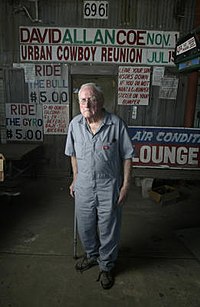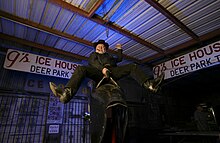| This article is an autobiography or has been extensively edited by the subject or by someone connected to the subject. It may need editing to conform to Misplaced Pages's neutral point of view policy. There may be relevant discussion on the talk page. (July 2013) (Learn how and when to remove this message) |
Charley Sherwood Cryer (September 2, 1927 – August 13, 2009) was an American entrepreneur. After forming a partnership with Mickey Gilley, Cryer became co-owner of Gilley's, a Pasadena, Texas-based western nightclub and bar.
| Sherwood Cryer | |
|---|---|
 Cryer in 2007 Cryer in 2007 | |
| Born | Charley Sherwood Cryer (1927-09-02)September 2, 1927 Diboll, Texas, U.S. |
| Died | August 13, 2009(2009-08-13) (aged 81) Pasadena, Texas, U.S. |
Personal life
| This section does not cite any sources. Please help improve this section by adding citations to reliable sources. Unsourced material may be challenged and removed. (August 2023) (Learn how and when to remove this message) |
Charles Sherwood Cryer was from Diboll, Texas, and worked as a welder for Shell Oil for a few years after his service in the Air Force during World War II. In addition to operating Gilley's, Cryer owned and managed convenience stores, bars, sign shops, and vending machines in the Houston area. He wore overalls, collected old coins, and enjoyed listening to classic country music. Cryer married twice and had children. He was of French and German descent.
Gilley's Club

Cryer settled in Pasadena, where his large tent-style honky tonk concept developed into what became Gilley's in 1971, located on a sprawling parcel of land at 4500 Spencer Highway, Pasadena, Texas 77504. It was named after country music artist Mickey Gilley. Cryer met Gilley in a bar where Gilley was performing and invited him to become a co-owner of Cryer's new club. Gilley, the cousin of Jerry Lee Lewis, was soon playing six nights a week, helping the new hotspot to attract entertainers like Willie Nelson, Charlie Daniels, Crystal Gayle, Hank Williams Jr., Jerry Lee Lewis, George Jones, Johnny Lee, Conway Twitty, Keith Whitley, and hundreds more.
Gilley's success and the Mechanical bull

Gilley's fame spread in the early 1980s with the help of Cryer's patent-holding, the mechanical bull.
The bull became a huge nightly draw as cowboys from the area took turns testing their skill in front of large crowds. Cryer and Gilley expected lawsuits from patrons getting hurt on the bull but no one sought them. Rides were conducted with a sign posted nearby stating "Ride At Your Own Risk."
Urban Cowboy
The bull was prominently featured in the 1980 film Urban Cowboy, with actors John Travolta, Debra Winger, and Scott Glenn shown riding the bull in many scenes.
Journalist Aaron Latham became a frequent visitor of the club, and Cryer asked Latham to write about Gilley's. Latham captured the spirit of Gilley's in a cover story for Esquire magazine titled "The Ballad of the Urban Cowboy: America's Search for 'True Grit'" for the September 1978 issue. Music executive Irving Azoff took notice and secured rights to the story for a movie. Latham and director James Bridges co-wrote the screenplay, John Travolta was chosen for the lead role of Bud Davis, and Debra Winger was selected to play Sissy, Bud's romantic interest. The movie was filmed on-location in Pasadena, with all of the club interiors and exteriors filmed at Gilley's, and regular patrons and locals featured as extras. It was a box office hit in 1980, grossing over $50 million. The film's soundtrack showcased a collection of country music's top artists and songs, including the hit "Lookin' For Love" by Johnny Lee.
After the movie's release, the club's popularity skyrocketed. Gilley's launched its own beer brand, radio show, recording studio, and hundreds of merchandise items from drinking glasses and stickers to panties and jeans emblazoned with the Gilley's logo. Gilley's white-and-red bumper stickers were commonly seen on cars throughout the Houston area. Fans would steal tiles from the acoustical ceiling because they were stamped with the club's logo. With Gilley's indoor rodeo arena as an added attraction, the 48,000 square feet (4,500 m) club hosted a packed house of thousands every night. The space fielded oversized bars and dance floors to accommodate crowds, and the club was so big that visitors could not see from one end of the building to the other. With a capacity of 6,000, Gilley's was listed in the Guinness Book of World Records as the world's largest night club.
Open seven nights a week from 10 am to 2 am, Gilley's regularly featured a myriad of activities, contests, and food. The club offered dozens of pool tables, pinball machines, video arcade games, punching bag games, even strong-arm wrestling games. There were mechanical bulls, mechanical horses, and mechanical calves. Cryer supplied the mattresses that surrounded the mechanical bull, often driving around Pasadena collecting discards based on tips on where to find them. Gilley's staged everything from Dolly Parton look-alike contests to tricycle races, with cowboys often falling off of the trikes to the amusement of the crowd.
Closure
Cryer managed the club's operations until he and Gilley had a falling out in 1989. Gilley felt that Cryer was neither properly maintaining the facility nor booking the high-profile musicians the club was famous for, and wanted to disassociate with the club by removing his famous name. Gilley's closed and litigation between the two partners began. Cryer did not want to lose control of Gilley's and attempted to produce documentation showing the partnership was still valid. Gilley won the court case, and Cryer was ordered to pay Gilley $17 million. The dispute permanently closed Gilley's, ending an 18-year run that saw country music become mainstream in large part due to the club's widespread fame. On July 5, 1990, a fire quickly spread throughout the main building, destroying the club. Gilley and several others in Pasadena suspected that Cryer had the club burned in retaliation over the court decision, but Cryer denied the allegation. Cryer filed for bankruptcy after the court battle with Gilley.
Death
Cryer died on August 13, 2009, at the age of 81.
References
- ^ Patterson, Randal. "Sherwood's Rules". Houston Press. Retrieved 12 October 2014.
- "Remembering Gilley's". Chron.com. Retrieved 12 October 2014.
- Russell, Alan (1986). The Guinness Book of Records 1987. Guinness Superlatives Ltd. p. 108. ISBN 0-85112-439-9. Retrieved March 10, 2024 – via Internet Archive.